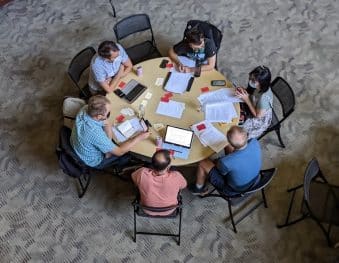NEWS
Deliberative Citizenship Initiative: How Can We Get People to the Table?

Over the past couple months, the DCI Fellows have held deliberations with students, faculty, community members and alumni on a range of topics from election accessibility to free speech and inclusion. As a Fellow, I’ve deliberated with both familiar and unfamiliar faces, people younger and older than me from a wide range of backgrounds and experiences.
 As Daniel, a fellow DCI Fellow, pointed out in his blog post, deliberation that pushes people towards new ideas serves society. I came to Davidson from New York City, a political echo chamber where it’s often difficult to find ideological diversity. Working with DCI, I’ve recognized the importance of engaging with views that challenge your own
As Daniel, a fellow DCI Fellow, pointed out in his blog post, deliberation that pushes people towards new ideas serves society. I came to Davidson from New York City, a political echo chamber where it’s often difficult to find ideological diversity. Working with DCI, I’ve recognized the importance of engaging with views that challenge your own
One of the most important elements of deliberation is also one of its greatest downsides. Deliberation is based upon individuals’ voluntary participation in political dialogues, without compulsion or coercion. This is great. In my D-Teams, some members mentioned how the loss of civil disagreement and the rise of hyper-partisanship has motivated them to become more engaged in democratic processes like deliberation.
On the other hand, people with strongly differing viewpoints are more likely to oppose deliberation. Outside of the DCI, I’ve heard people say, “I could never be friends with a Republican,” as well as “All Democrats are crazy.” The act of deliberation, where mutual respect and thoughtful engagement are key, is something that could help soften these biases. People enter deliberations not as “Democrats” or “Republicans,” but as people with ideas, values, and feelings. After all, much of the political polarization in society has been fueled by people from opposing ends of the ideological spectrum not engaging with one another, or at best, talking past one another.
Certainly, there are valid reasons not to engage in deliberation. Some individuals may feel isolated due to their identity in the conversation. Others may not want to engage with people who they don’t feel respect them. The political and personal realms are not mutually exclusive, and political beliefs are often heavily intertwined with personal values and considerations. Not everyone has to engage on every issue, especially those that are particularly personal and sensitive to them.
conversation. Others may not want to engage with people who they don’t feel respect them. The political and personal realms are not mutually exclusive, and political beliefs are often heavily intertwined with personal values and considerations. Not everyone has to engage on every issue, especially those that are particularly personal and sensitive to them.
On other issues, however, that are not so personal, the question still remains: How do we encourage people with drastically different perspectives to deliberate with one another? One way might be to emphasize that those perspectives are indeed welcome and important for everyone to hear. Deliberation’s necessary emphasis on mutual respect and civility does not preclude strong opinions and even passionate arguments but welcomes and even requires participants to engage with them, as long as everyone is treated as equal participants in the conversation.
The goals of the DCI extend far beyond our campus and the town of Davidson. But the scope of our program will remain limited if only people on opposite sides of the political center are willing to come to the table. I have just suggested one possibility, but we need to find multiple ways for people with vastly different viewpoints to feel like they belong in these conversations. No doubt this task is easier said than done. But before we talk about restoring democracy or restoring our institutions, it is important to restore our willingness to talk with people we strongly disagree with.
Clyde Dwyer ’24 is a Davidson College student, a DCI Fellow, and an intended Politics, Philosophy and Economics major from Brooklyn, New York. On campus he is in Club Soccer, C2i, Jewish Student Union, and Intramural Soccer. In his free time, he loves cooking, riding his bike, playing soccer, and watching soccer (lots of World Cup recently).


